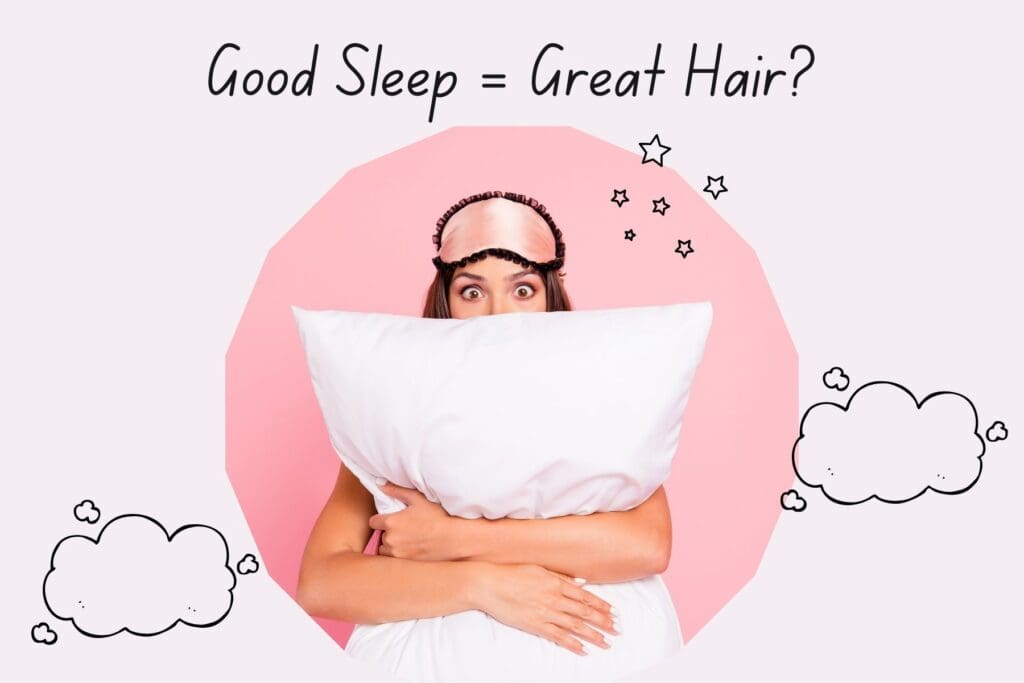Can a good night of sleep help prevent hair loss and ultimately create healthier hair?
The importance of sleep for our health cannot be overstated. In addition to improving our physical and mental health, a good night’s rest aids in enhancing our moods, creating a healthier heart, controlling weight, and strengthening our immune systems. Consistent sleep patterns can also make all the difference between having healthy hair or continuing to lose it.
Here are two main ways sleep directly affects our hair:
Sleep Equals Lower Cortisol levels
During sleep deprivation, the body responds as if it is in distress, releasing cortisol, the stress hormone. As a result of cortisol disrupting cell signaling, a large number of hairs are prematurely pushed into a resting stage. Three months after the resting phase, all of those hair follicles enter the fall-out phase, during which hair shedding becomes more and more visible when combing or washing hair. This increased shedding is referred to as Telogen Effluvium or stress-related hair loss. Consistent sleep habits help you better manage stress and decrease the likelihood of this condition
As We Sleep, Hair Follicles Are Regenerated
A good night’s sleep will significantly aid your body’s regenerative process. This is crucial to the hair growth process. While you sleep, your body begins extensive repair and regeneration of all cells, including hair follicles. With consistent sleep, we allow growth hormones and enzymes to build proteins, which aids in your hair growing strong, healthier, and more lustrous each day. When we become sleep deprived, not only does our body not produce sufficient hormones and enzymes for growth, but our immune system also becomes weakened. The weakening of your immune system does not allow your hair to absorb the nutrients it requires for healthy growth. Having proper nutrition in your hair is essential for its health, volume, shine, color, and overall condition of your hair.
When You Sleep, Be Careful Not To Damage Your Hair
Now that we understand the incredible importance sleep has on hair, here are four ways that you can prevent damage to hair while you sleep:
- Sleep on a satin pillowcase
- Avoid sleeping with wet hair
- Detangle hair before bed
- Never sleep with your hair tied up (ponytail)
Discover the Health of Your Hair & Scalp
Statistics show that around 68% of Americans struggle to fall asleep at least once a week. In addition, 1 in 3 adults regularly don’t get enough sleep, and 70 million Americans have chronic sleep problems. All that lack of sleep contributes to your hair shedding and loss and increases oiliness, itch, and dandruff.
Now is the time to begin making changes to your lifestyle to get the sleep needed for healthy hair and to start combating scalp hair loss and other scalp concerns before they lead to bigger hair and scalp problems. The more you do today, the better your hair and scalp will be for years to come
Don’t be like most people who think there must be a shampoo that will prevent the problems you are experiencing. Our exclusive ScalpCheck gives you an in-depth analysis designed to help determine the health of your hair and scalp. This allows us to customize a hair and scalp care protocol based on your specific needs. Ultimately, treating sleep-related hair scalp problems and helping you have beautiful, healthy hair and scalp for years to come.


